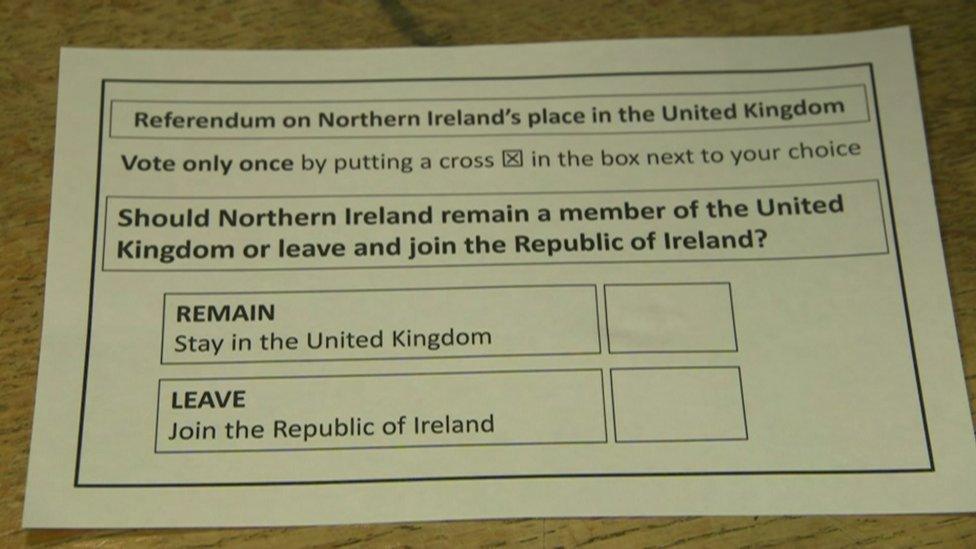Border poll: SDLP rejects any change to Irish unity referendum rules
- Published
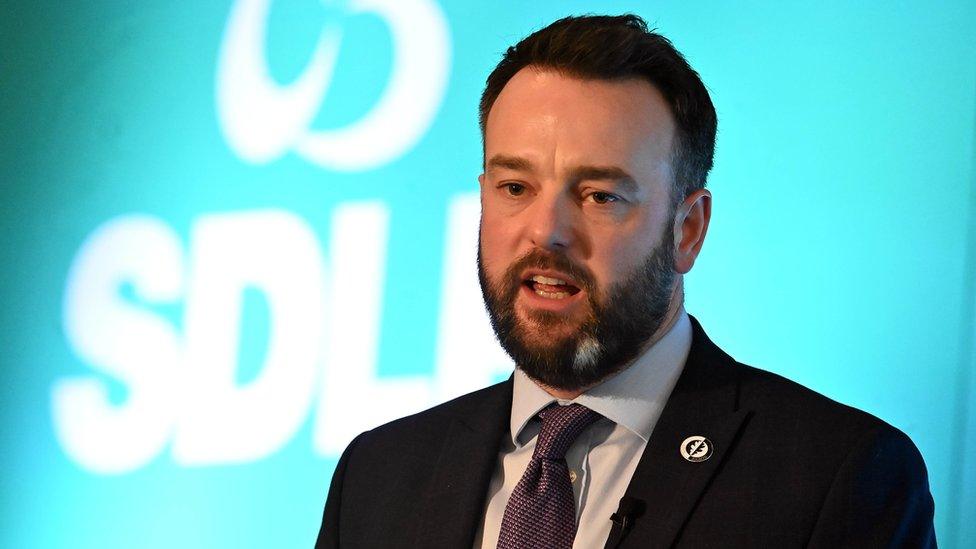
Colum Eastwood was responding to reported comments by an NIO minister
There can be no "changing the goalposts" on the level of support needed for a united Ireland referendum to pass, the SDLP has said.
It comes after NI Minister Steve Baker reportedly said a border poll should need the support of a "super-majority".
At present, such referendums require a simple majority of 50% plus one.
Mr Baker cited his experience in the UK's Brexit referendum and said he regretted now it did not require the support of 60% of those who voted.
According to the 1998 Good Friday Agreement, there would be no change to Northern Ireland's constitutional status without the consent of a majority of people of Northern Ireland.
The Irish Times reported that Mr Baker made his remarks on Monday, external, while speaking after a meeting of British and Irish politicians in County Kildare.
"Would anyone here seriously want a 50% plus one united Ireland result in Northern Ireland? I speak personally," Mr Baker reportedly told the meeting.
"I deliberately say it like that because some of you I know would (want a 50+1 result). But just reflect on the trouble we had from running a 50% plus one referendum in the United Kingdom."
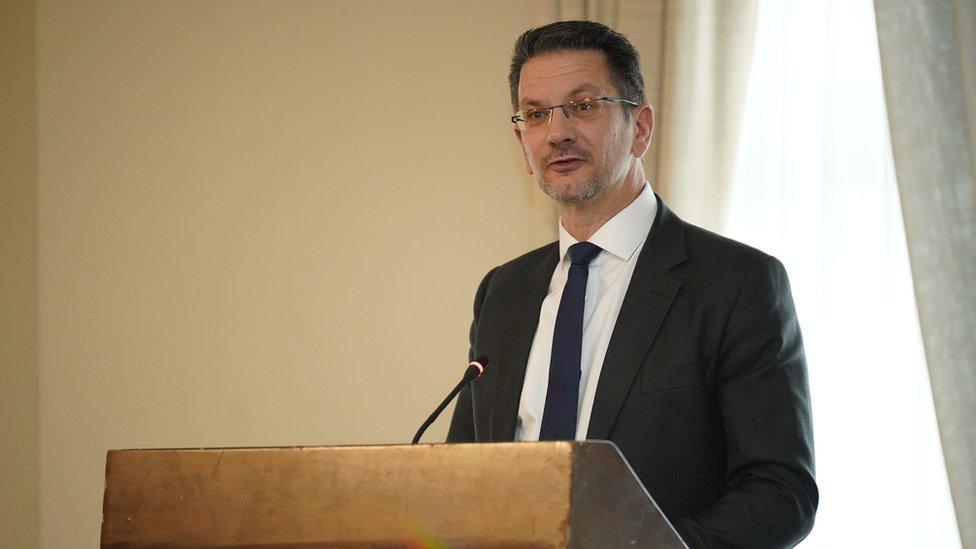
Steve Baker expressed his personal view about border poll rules after addressing the British-Irish Parliamentary Assembly in Kildare
'Unionist votes cannot be worth more'
In response SDLP leader Colum Eastwood warned that the principle of consent was "not up for debate".
"Steve Baker is right to acknowledge the significant deficiencies in the public debate that preceded the Brexit referendum. There are huge lessons for those of us who support constitutional change and a future referendum on unity," he said.
"But fundamentally, there will be no super majority requirement for change because unionist votes cannot be worth more than anyone else's," Mr Eastwood added.
"If a simple majority is the requirement to remain in the UK then a simple majority is what will be needed to unite our island. There'll be no changing the goalposts now."
The Northern Ireland Office (NI) was asked to clarify Mr Baker's remarks about the super-majority vote.
Its spokesperson said: "The Belfast (Good Friday) Agreement is clear that any change to the constitutional position of Northern Ireland would require the consent of a majority of its people.
"In accordance with the principle of consent, Northern Ireland will remain part of the UK for as long as its people wish for it to be.
"We are absolutely clear that there is no basis to suggest that a majority of people in Northern Ireland wish to separate from the United Kingdom."
Steve Aiken from the Ulster Unionist Party tweeted that Mr Baker had been "put on the spot", external and "was trying to make an analogy".
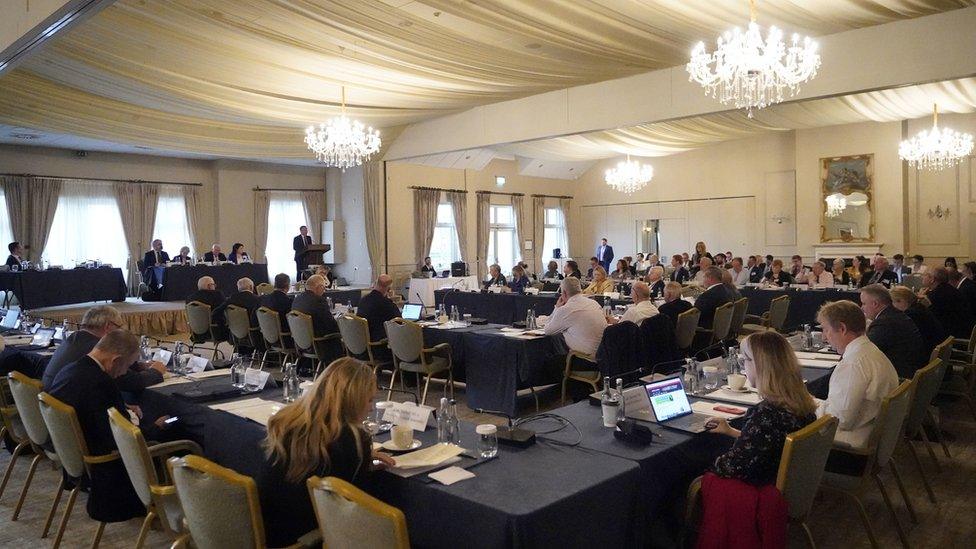
The British-Irish Parliamentary Assembly took place at the K Club in Kildare
Four years ago, a veteran SDLP politician suggested it would be very difficult to unite the island of Ireland through a simple 50% plus one majority vote in a border poll.
The late Seamus Mallon, who served as deputy first minister of Northern Ireland from 1998 to 2001, warned it could result in "chaos".
"Unfortunately, in the pursuit of unity, it would cause further and deeper disunity because it simply makes another minority a new minority," Mr Mallon said in 2019.
At the time, Mr Eastwood said he disagreed with Mr Mallon about the 50% plus one mechanism, but he also defended his former party stalwart against the abuse he received for making the remarks.
Last year, DUP MP Ian Paisley sought to introduce a bill that would require a larger majority to permit UK constitutional change but it has yet to be debated in Parliament.
Devolution talks
Meanwhile, Mr Baker has told delegates at the County Kildare event that his colleague Secretary of State Chris Heaton-Harris has been "relentless" in his efforts to restore devolved government.
The government's position in recent weeks is that talks with the DUP are in the "final stages".
Mr Baker said we would "urge all parties to return to power sharing".
The DUP, Northern Ireland's largest unionist party, walked out of government at Stormont 20 months ago in protest over post-Brexit trade rules for Northern Ireland.
A new deal, the Windsor Framework, was agreed by the UK and EU in February but the DUP said it did not address all of its concerns.
DUP leader Sir Jeffrey Donaldson remains in talks with the UK government in a bid to secure further legislation, which he has said is aimed at securing Northern Ireland's place within the UK internal market.
He has insisted that he is not working to any deadline.
'Core priority'
Addressing a meeting of the British-Irish Parliamentary Assembly, Mr Baker said Northern Ireland "works best" when governed locally.
"The secretary of state's core priority is the restoration of the institutions and that is why he is relentless in his efforts to get Stormont back up and running so that the necessary decisions can be taken to improve public services... my goodness, every time I visit I see how necessary it is."
Irish Finance Minister Michael McGrath told the same event that both Dublin and London can "do better" in working to restore power sharing.
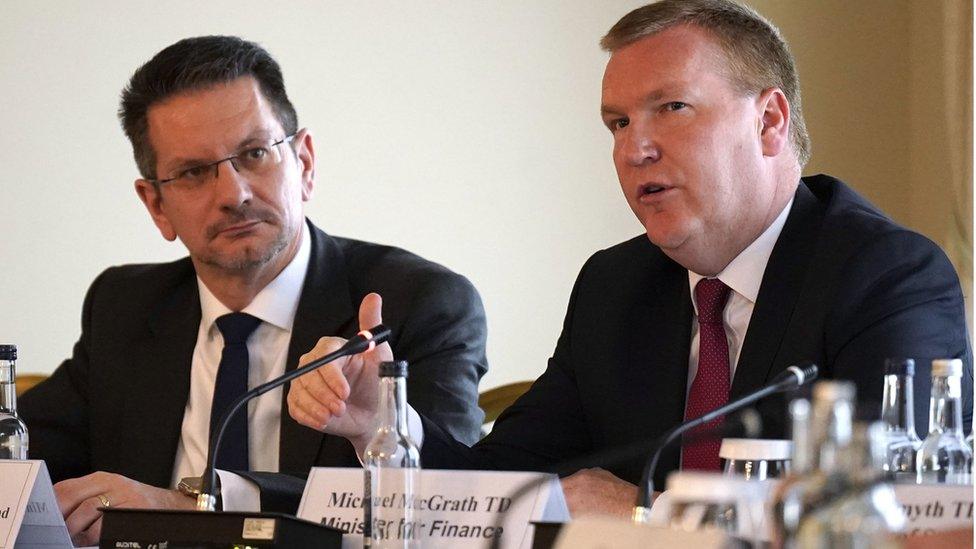
Northern Ireland Office minister Steve Baker (left) listening to Irish Minister for Finance Michael McGrath during the Kildare meeting
"The continued absence of a Northern Ireland executive and the consequent effect on north-south work, especially at ministerial level, is something I feel in my work every single week," he said.
"This is where, as politicians and as neighbours, we can do better.
"I, for one, look forward to the day when I can pick up the phone to my counterpart in the Northern Ireland Executive in the same way that I can do with my counterparts in Great Britain, or indeed elsewhere in Europe."
Mr Baker added that he welcomed relations with the Irish government being on a "new footing", after years of friction during the initial Brexit negotiations.
- Published5 October 2023
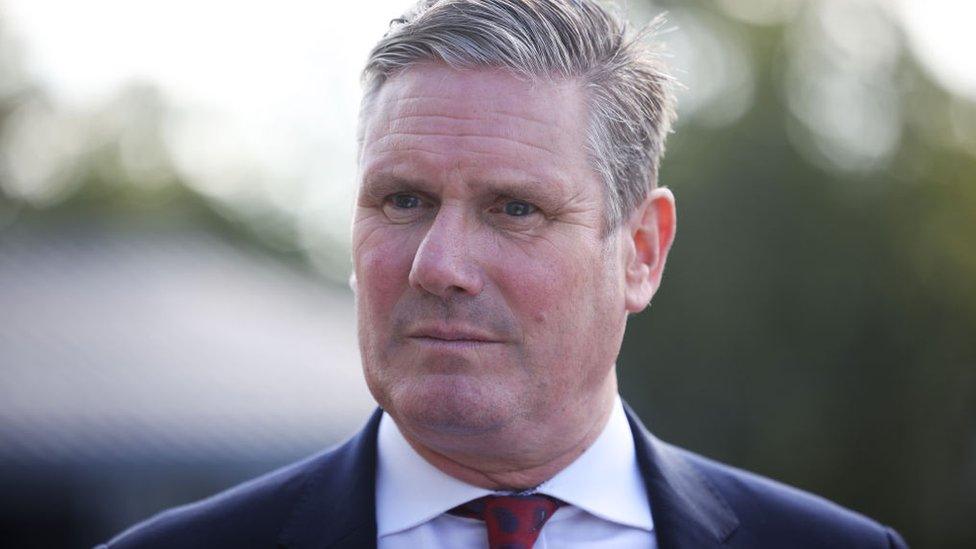
- Published9 November 2022
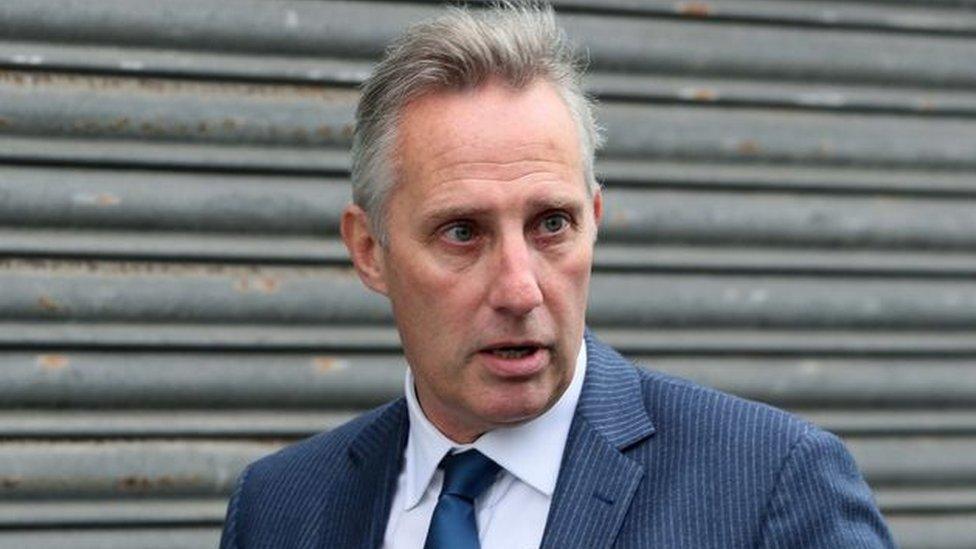
- Published14 October 2023

- Published12 September 2023
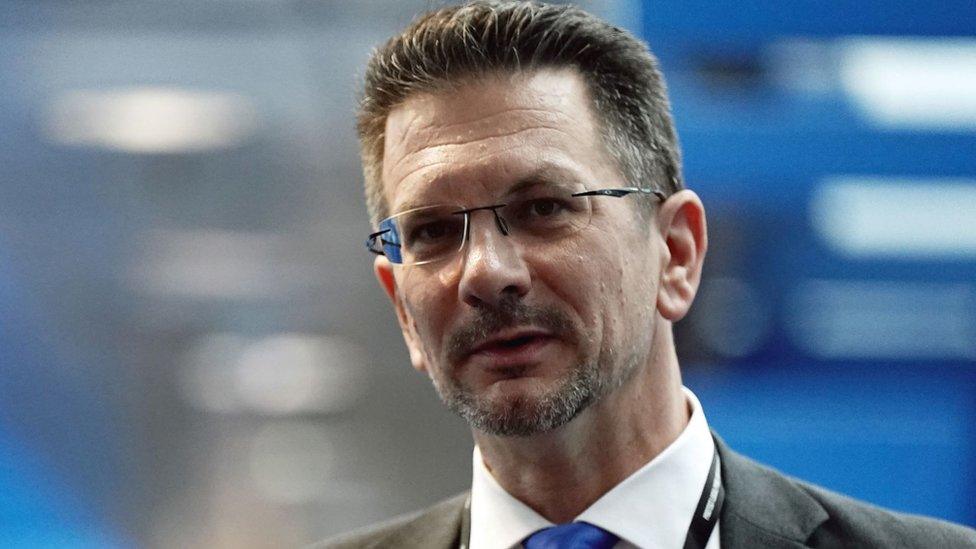
- Published1 October 2023
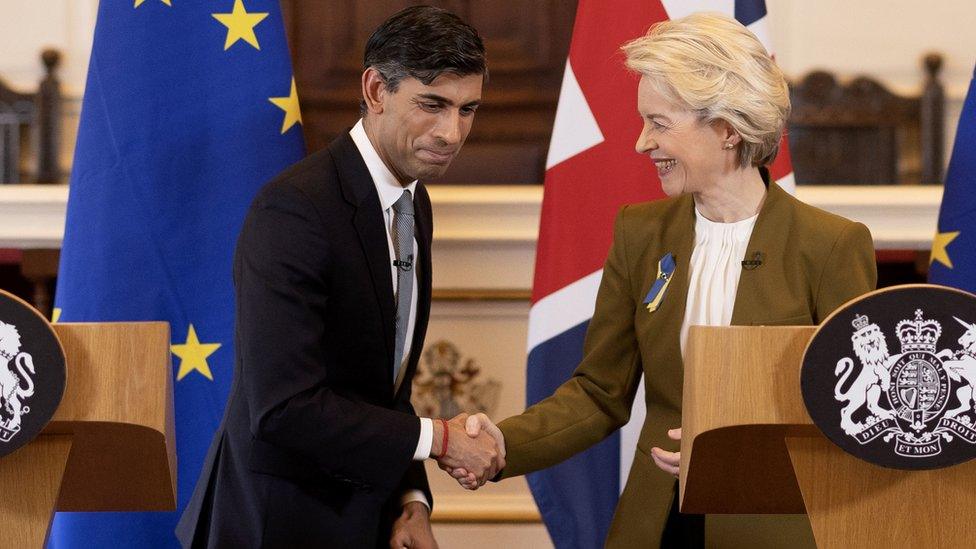
- Published24 May 2019
